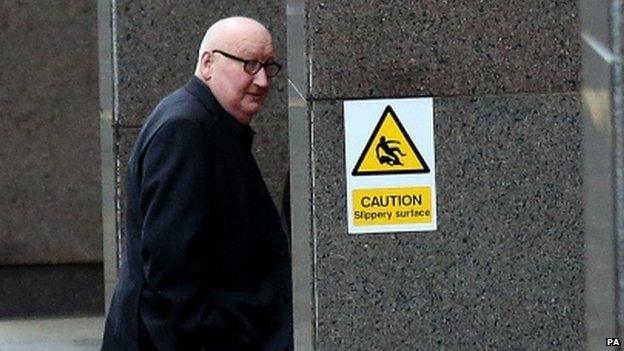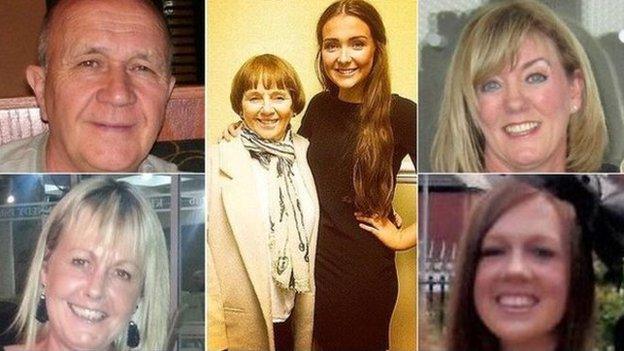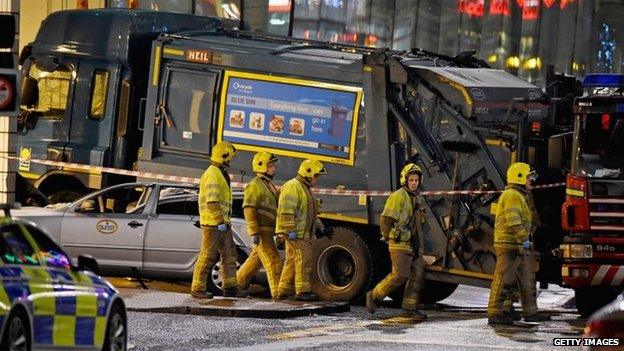Law chief says no bin lorry prosecution was 'right decision'
- Published
Throughout the fatal accident inquiry, a central theme has been the decision by prosecutors not to bring any charges against the bin lorry driver, Harry Clarke.
Scotland's top law officer has said it was the "right decision" not to prosecute driver Harry Clarke over the Glasgow bin lorry crash.
Lord Advocate Frank Mulholland said there was "insufficient evidence in law" to bring proceedings.
Mr Mulholland defended the speed with which the Crown Office made the decision not prosecute the driver.
He said no evidence had been heard at the inquiry into the crash that the Crown did not know at the time.
A fatal accident inquiry (FAI), which has been running for five weeks, heard that 58-year-old Mr Clarke was unconscious at the wheel when the Glasgow City Council bin lorry veered out of control in Queen Street on 22 December last year.
It also heard allegations Mr Clarke lied about his medical history to doctors, the DVLA and his employer.

The inquiry heard that Harry Clarke was unconscious at the wheel of the bin lorry when it crashed
Before it crashed into the side of the Millennium Hotel in George Square, the lorry had killed six people and injured 15 others.
The families of some of the victims said Mr Clarke should face criminal charges for his actions and they intend to bring a private prosecution.
The lord advocate, in whose name all prosecutions on indictment are conducted, told BBC Scotland that private prosecutions were "very rare".
He said no court would grant authority for a private prosecution unless there was sufficient evidence in law.
"The view that Crown Counsel took in this matter, together with all the people working on the case, was that there was insufficient evidence in law," he said.
Medical condition
Mr Mulholland said he understood the "anger and upset" of the families of the victims that no-one had been found criminally responsible for the deaths.
He said there was no dispute that Mr Clarke had been unconscious at the wheel of the bin lorry and as such he did not have the required "criminal intention".
The chief prosecutor said it would be necessary to demonstrate "forseeability".
"In other words, Mr Clarke, as a result of his ongoing medical condition, must know that he was unfit to drive on that day," the lord advocate said.

(Clockwise from top left) Jack Sweeney, Lorraine Sweeney, Erin McQuade, Jacqueline Morton, Stephenie Tait and Gillian Ewing were killed in the crash
"That is what the Crown requires to prove."
The law officer said that since the blackout when he was a bus driver in 2010, Mr Clarke had experienced no other episodes for a period of four-and-a-half years.
He said that during that period, Mr Clarke was a professional driver for both First Bus and Glasgow City Council, driving PSV vehicles, gritting lorries, minibuses and bin lorries, without any episodes.
The lord advocate said Crown Counsel took this into account as well as a number of other factors.
He said: "Firstly no doctor had told Mr Clarke he was unfit to drive. In fact no doctor had told him he should notify the DVLA about his 2010 episode.
'Fit to drive'
"If he had notified the DVLA about his 2010 episode, the worst that could have happened to Mr Clarke would have been that his licence was suspended for 12 months maximum and if there was no cause for concern his licence would have been returned to him.
"When he moved from First Bus to Glasgow Council, he got an acceptable reference and the occupational doctor for First Bus reviewed him.
"He was well aware of the 2010 incident, and he concluded he was fit to drive and didn't need to notify the DVLA.
"And it is noteworthy that following the events of December 2014, the DVLA were notified; full details of the George Square incident together with the 2010 incident, and as a result of DVLA procedures, his licence was returned to him.

Six people died and 15 were injured in the crash
"So if you put all that evidence together you cannot conclude in law that Mr Clarke knew or must have known he was medically unfit to drive that day."
Mr Mulholland said that was supported by colleagues of Mr Clarke, who gave evidence there were no warning signs whatsoever.
Mr Mulholland added: "The FAI is different than a criminal trial. It is there to establish causes of death then look at what recommendations can be made by the sheriff to prevent such a tragedy happening again.
"A criminal trial is different. It looks at the issue of guilt or innocence in relation to charges brought.
'Insufficient evidence'
"No proceedings were brought against Mr Clarke. That was the right decision. It was the only decision that can be made because there is insufficient evidence in law."
The lord advocate said that to bring a case to court without sufficient evidence would be "an abuse of process" and would cause a lack of confidence in the system.
He said: "We have to take hard decisions on a cold, hard analysis of the evidence and in this case there is insufficient evidence in law to prosecute Mr Clarke."
Mr Mulholland said the decision not to prosecute was taken by a senior member of the Crown counsel cadre and he supported it.
He also rejected criticism that the decision not to charge Mr Clarke, taken within nine weeks of the tragedy, was too quick.
He said there was a "thorough and complete investigation" but it was in the public interest to move quickly because people wanted answers.
The lord advocate said there were no barriers to making the decision - unlike in the case of the Clutha helicopter disaster, which took place a year earlier but which is still waiting for the results of an Air Accidents Investigation Branch inquiry.
He added: "There is no evidence which has come out at the Fatal Accident Inquiry which the Crown were not aware of at the time the major decisions were taken."